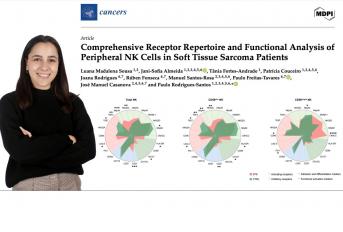Associação Portuguesa de Investigação em Cancro
Estudo revela um comprometimento funcional das células NK no sarcoma de tecidos moles
Estudo revela um comprometimento funcional das células NK no sarcoma de tecidos moles

Os sarcomas de tecidos moles (STS) são um grupo raro e heterogéneo de tumores malignos, o que torna o seu diagnóstico e tratamento particularmente desafiantes. Os tratamentos disponíveis continuam a ser pouco eficazes para muitos doentes, levando à progressão da doença e a uma baixa taxa de sobrevivência.
Curiosamente, embora a imunoterapia tenha tido origem nos sarcomas, durante décadas prevaleceu a ideia de que estes tumores eram “frios”, ou seja, com pouca infiltração de células imunitárias. Hoje sabe-se que o sistema imunitário desempenha um papel fundamental nos STS. Ainda assim, continua a haver escassez de estudos focados nas interações entre o sistema imunitário e estes tumores, conhecimento essencial para abrir novas perspetivas no desenvolvimento de estratégias imunoterapêuticas mais eficazes.
Com este objetivo, investigadores e clínicos da Universidade de Coimbra analisaram detalhadamente as células Natural Killer (NK) no sangue de doentes com STS. Estas células, que atuam como primeira linha de defesa por reconhecerem e eliminarem células tumorais sem necessidade de ativação prévia, apresentavam sinais de comprometimento funcional e um repertório de recetores distinto do observado em indivíduos saudáveis.
Uma vez que este comprometimento funcional pode ter um papel central na progressão da doença, estes resultados abrem caminho a futuras estratégias que procurem restaurar a função anti-tumoral das células NK, potenciando assim a resposta do sistema imunitário contra o cancro.
Autores e Afiliações:
Luana Madalena Sousa1,2, Jani Sofia Almeida1,2,3,4,5,6, Tânia Fortes Andrade1, Patrícia Couceiro1,2,4,5,6, Joana Rodrigues6,7, Ruben Fonseca6,7, Manuel Santos-Rosa2,3,4,5,6, Paulo Freitas-Tavares6,7, José Manuel Casanova2,4,5,6,7, Paulo Rodrigues-Santos1,2,3,4,5,6*
1 University of Coimbra, Center for Neuroscience and Cell Biology (CNC), Laboratory of Immunology and Oncology, Coimbra, Portugal;
2 University of Coimbra, Center for Innovation in Biomedicine and Biotechnology (CIBB), Coimbra, Portugal;
3 University of Coimbra, Faculty of Medicine (FMUC), Institute of Immunology, Coimbra, Portugal;
4 University of Coimbra, Faculty of Medicine, Center of Investigation in Environment, Genetics and Oncobiology (CIMAGO), Coimbra, Portugal;
5 University of Coimbra, Faculty of Medicine, Coimbra Institute for Clinical and Biomedical Research (iCBR), Coimbra, Portugal; 5 University of Coimbra, Center for Innovation in Biomedicine and Biotechnology (CIBB), Coimbra, Portugal;
6 Clinical Academic Centre of Coimbra (CACC), Coimbra, Portugal;
7 Coimbra Local Health Unit (ULSC), University Clinic of Orthopedics, Orthopedics Service, Tumor Unit of the Locomotor Apparatus (UTAL), Coimbra, Portugal;
Abstract:
Background: Soft tissue sarcomas (STSs) are a rare and heterogeneous group of mesenchymal tumors with limited response to current therapies, particularly in advanced stages. STS tumors were traditionally considered "cold" tumors, characterized by limited immune infiltration and low immunogenicity. However, emerging evidence is challenging this perception, highlighting a potentially critical role for the immune system in STS biology.
Objective: Building on our previous findings suggesting impaired natural killer (NK) cell activity in STS patients, we aimed to perform an in-depth characterization of peripheral NK cells in STS.
Methods: Peripheral blood samples from STS patients and sex- and age-matched healthy donors were analyzed to assess NK cell degranulation, IFNγ production, and receptor repertoire.
Results: Functional assays revealed a notable reduction in both degranulation and IFNγ production in NK cells from STS patients. STS patients also exhibited dysregulated expression of activating and inhibitory NK cell receptors. Principal component analysis (PCA) identified CD27 and NKp44 as critical markers for distinguishing STS patients from healthy donors. Increased CD27 expression represents a shift towards a more regulatory NK cell phenotype, and we found that CD27 expression was negatively correlated with NK cell degranulation and IFNγ production. ROC curve analysis demonstrated strong potential to distinguish between the groups for both CD27 (AUC = 0.85) and NKp44 (AUC = 0.94).
Conclusion: In conclusion, STS patients exhibited impaired NK cell function, altered receptor repertoire, and a shift towards a less cytotoxic and more regulatory phenotype.
Revista: Cancers
Link: https://www.mdpi.com/2072-6694/17/15/2508




